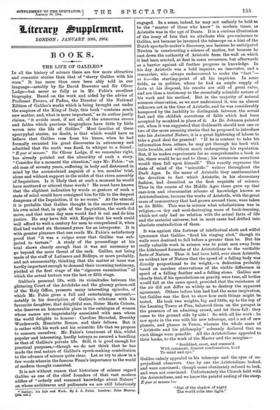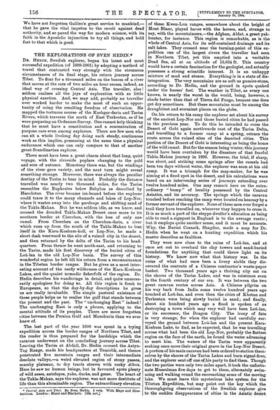BOOKS.
IN all the history of science there are few more attractive and romantic stories than that of "starry Galileo with his woes." It has more than once been ably told in our language—notably by Sir David Brewster and Sir Oliver Lodge—but never so fully as in Mr. Faille's excellent biography. Based on the work and aided by the advice of Professor Favaro, of Padua, the Director of the National Edition of Galileo's works which is being brought out under the auspices of the King of Italy, this book "contains much new matter, and, what is more important," as its author justly claims, "it avoids most, if not all, of the numerous errors and fables which previous biographers have little by little woven into the life of Galileo." Most familiar of these apocryphal stories, no doubt, is that which would have us believe that Galileo rose from his knees, when he had formally recanted his great discoveries in astronomy and admitted that the earth was fixed, to whisper to a friend : "E pur si muove." Sir Oliver Lodge, if we remember right, has already pointed out the absurdity of such a story. "Consider for a moment the situation," says Mr. Fahie : "an old man of seventy years, suffering in body and distressed in mind by the accumulated anguish of a ten months' trial, alone and without support in the midst of that stern assembly of Inquisitors. Is it likely that at such a moment be would have muttered or uttered these words ? He must have known that the slightest indication by words or gesture of such a state of mind would have consigned him for life to the deepest dungeons of the Inquisition, if to no worse." At the utmost, it is probable that Galileo thought in the secret fortress of his own mind that, in spite of the Inquisition, the earth did move, and that some day men would find it out and do him justice. He may have felt with Kepler that his work could well afford to wait a century for men to comprehend it, when God had waited six thousand years for an interpreter. It is with greater pleasure that one reads Mr. Fahie's satisfactory proof that "it was a vulgar error that Galileo was sub- jected to torture." A study of the proceedings at his trial shows clearly enough that it was not necessary to go beyond the mere threat of the rack. Galileo, not being made of the stuff of Latimers and Ridleys, or more probably, and not unreasonably, thinking that the matter at issue was hardly important enough to demand their crowning testimony, yielded at the first stage of the "rigorous examination" of which the actual torture was the last or fifth stage.
Galileo's personal life, with its vicissitudes between the glittering Court of the Archduke and the gloomy prison-cell of the Holy Office, presents many interesting episodes, of which Mr. Fahie gives a full and entertaining account,— notably in his description of Galileo's relations with his favourite daughter, that delightful nun, Sister Maria Celeste, who deserves an honourable place in the catalogue of women whose names are imperishably associated with men whom the world delights to honour : Caroline Herschel, Dorothy Wordsworth, Henriette Renan, and their fellows. But it is rather with his work and his scientific life that we propose to concern ourselves. Mr. Fahie's treatment of this, whilst popular and interesting, hardly betrays so assured a handling as that of Galileo's private life. Still, it is good enough for practical purposes,—though we do not think that he has made the real nature of Galileo's epoch-making contribution to the advance of science quite clear. Let us try to show in a few words wherein the famous Pisan's importance to the world of modern thought consisted.
It is not without reason that historians of science regard Galileo as one of the chief founders of that vast modern edifice of "orderly and reasoned knowledge about Nature" on whose architraves and pediments we are still laboriously
* Galileo: his Life and Work. By J. J. Fahie. London: John Murray. 1;164. Wt. 1
engaged. In a sense, indeed, he may not unfairly be held to be the "master of those who know" in modern times, as Aristotle was in the age of Dante. It is a curious illustration of the irony of fate that we attribute this pre-eminence to Galileo, not because he invented the telescope on a hint of the Dutch spectacle-maker's discovery, nor because he anticipated Newton in constructing a science of motion, but because he cast down the authority of Aristotle from the wall on which it had been erected, at first in mere reverence, but afterwards as a barrier against all further progress in knowledge. In
his day Aristotle was a bold inquirer, an innovator, and a researcher, who always endeavoured to make the " fact "—
TO Orr—the starting-point of all his inquiries. In some fields, as in politics, where he had an ample supply of facts at his disposal, his results are still of great value, and are thus a testimony to the essentially scientific nature of his work and his method. But in the majority of natural sciences observation, as we now understand it, was an almost unknown art in the time of Aristotle, and be was considerably hampered by the inability to distinguish between the actual fact and the childish accretions of fable which had been accepted by mankind in place of it. As Dr. Johnson pointed out, when it was suggested that Goldsmith should test one or
two of the more amazing stories that he proposed to introduce into his Animated Nature, it is a great lightening of labour to
take a good deal for granted! "If he is content to take his information from others, he may get through his book with little trouble, and without much endangering his reputation. But, if he makes experiments for so comprehensive a book as his, there would be no end to them ; his erroneous assertions would then fall upon himself." This exactly expresses the state of mind of the " scientific " writers throughout the Dark Ages. In the name of Aristotle they anathematised the devotion to fact which Aristotle, in his elementary fashion, had described as the first requisite of science.
Thus in the course of the Middle Ages there grew up that cast-iron and obscurantist scheme of knowledge known as Aristotelianism, because the works of Aristotle, with the great mass of commentary that had grown around them, were taken as its Bible. This was in science what scholasticism was in religion,—a dry and soul-destroying mass of book-learning, which not only had no relation with the actual facts of life and the material universe, but in most cases had drifted into absolute contradiction of them.
It was against this fortress of intellectual sloth and wilful ignorance that Galileo "fired his ringing shot," though its walls were destined to fall before a greater than be. But his really valuable work in science was to point men away from the hidebound formulas of the Aristotelians to the verifiable facts of Nature. Thus it had been held, ever since Aristotle, an evident law of Nature that the speed of a falling body was directly proportional to its weight,—a deduction probably based on careless observations of the visible difference in
speed of a falling feather and a falling stone. Galileo saw clearly that, if his speculations on gravity were true, all bodies would fall at the same speed, provided that the resistance of the air did not differ so widely as to destroy the apparent
agreement. Others before him had had the same inspiration, but Galileo was the first to show how such things might be tested. He took two weights, big and little, up to the top of the Leaning Tower at Pisa, balanced them on the parapet in the presence of an admiring crowd, and let them fall : they came to the ground side by side ! So with all his work : he saw spots in the sun with his new telescope, and a set of new planets, and phases in Venus, whereas the whole mass of "Aristotle and his philosophy" solemnly declared that no such things were possible. All tho Aristotelians appealed to their books, to the work of the Master and the margins-
" Scribbled, crost, and cramm'd
With comment, densest condensation, hard To mind and eye."
Galileo calmly appealed to his telescope and the eyes of un- prejudiced observers. One by one the Aristotelians looked, and were convinced ; though some obstinately refused to look, and were not convinced. Unfortunately the Church held with
the Aristotelians, and we know the painful ending of the story. E pur si muove !— " Out of the shadow of night
The world rolls into light."
We have not forgotten Galileo's great service to mankind,— that he gave the vital impetus to the revolt against dead authority, and so paved the way for modern science, with its faith in the Apostolic injunction to try all things, and hold fast to that which is good.























































 Previous page
Previous page